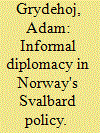| Srl | Item |
| 1 |
ID:
167523


|
|
|
|
|
| Summary/Abstract |
This article analyzes a little-noticed aspect of the international legal controversy pertaining to Svalbard’s maritime zones. It concerns where and by which method Norway should draw the boundaries between Svalbard’s continental shelf and the 200-mile zone, on the one hand, and other maritime zones subject to Norwegian jurisdiction, on the other. The assumption upon which the discussion rests is that the Spitsbergen Treaty signatories enjoy treaty rights in the maritime zones beyond Svalbard’s territorial waters. The law of the sea does not contain rules on the drawing of maritime boundaries between different parts of a state’s territory, but the rules on delimitation between states offer a strong analogy. In the search for an equitable solution, primacy should be given to geographical factors. The article argues that Norway could do more to enhance the openness regarding the Svalbard delimitation question since its outcome will be of significant interest to other states.
|
|
|
|
|
|
|
|
|
|
|
|
|
|
|
|
| 2 |
ID:
127887


|
|
|
|
|
| Publication |
2014.
|
| Summary/Abstract |
The Arctic archipelago of Svalbard is under a limited form of Norwegian sovereignty and its settlements - among the northernmost in the world - are sites of activity by a range of states, most notably Russia. Norway's Svalbard policy has historically focused on marginalizing Russian influence. Through the use of informal diplomacy involving the creation of an economically diverse town (Longyearbyen, population around 2,070) and the promotion of scientific research, Norway is consolidating its control over the archipelago. At the same time, however, it risks losing authority within Svalbard due to the strengthening of local democracy in Longyearbyen and the increasing opportunities in Svalbard for the involvement of non-traditional Arctic actors such as the Asian economic powers. This article considers the historical basis for the present situation in Svalbard as well as the complex results of Norway's attempt to achieve its foreign policy through informal diplomacy.
|
|
|
|
|
|
|
|
|
|
|
|
|
|
|
|
| 3 |
ID:
104176


|
|
|
|
|
| Publication |
2011.
|
| Summary/Abstract |
This article explains the position(s) of the United States in the maritime dispute adjacent to Svalbard. While the United States has regarded Norway's exclusive claim to the natural resources outside Svalbard as everything from "wishful thinking" to legally plausible, Washington maintains that it may have rights under the 1920 Svalbard Treaty to exploit the maritime zones adjacent to the archipelago. The U.S. reservation is the result of assessments and reassessments of legal considerations as well as national interests.
|
|
|
|
|
|
|
|
|
|
|
|
|
|
|
|
| 4 |
ID:
085476


|
|
|
|
|
| Publication |
2008.
|
| Summary/Abstract |
Drawing on the constructivist concept of 'securitisation', this article analyses Russia's perceptions of, and responses to, Norway's Svalbard policy in the 1990s and 2000s. The analysis focuses on three policy issues which have figured prominently on Russia's arctic security agenda in recent years: (1) the establishment and use of civilian radars and satellite ground stations on the archipelago, (2) the adoption of the Svalbard Environmental Protection Act, and (3) the Norwegian Coast Guard's fishery enforcement measures in the Svalbard Fisheries Protection Zone. The article concludes that despite the changes that have taken place in the Euro-Arctic region after the Cold War, Svalbard has not ceased to be a security concern for Russia.
|
|
|
|
|
|
|
|
|
|
|
|
|
|
|
|
| 5 |
ID:
162880


|
|
|
|
|
| Summary/Abstract |
The Arctic has been characterised as an area of low tension in relations between Russia and NATO states in the region. However, there are several emerging issues that could give rise to tensions in the future. James K Wither analyses the prominent example of the Norwegian archipelago of Svalbard, exploring how the territory’s distance from mainland Norway and peculiar legal status leave it politically and militarily vulnerable to Russian adventurism intended to test NATO’s cohesion and solidarity in a crisis.
|
|
|
|
|
|
|
|
|
|
|
|
|
|
|
|